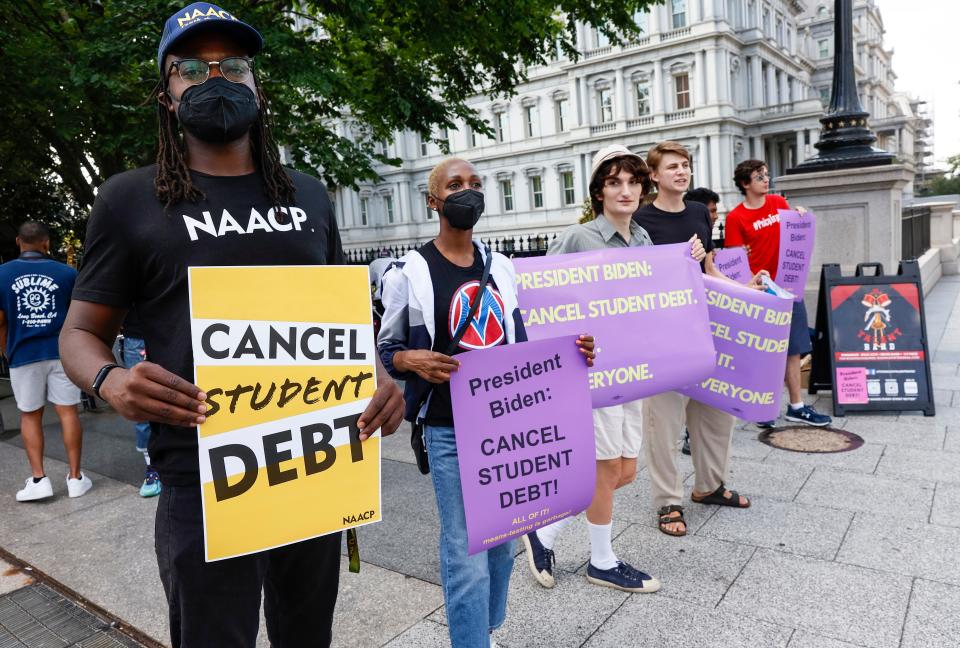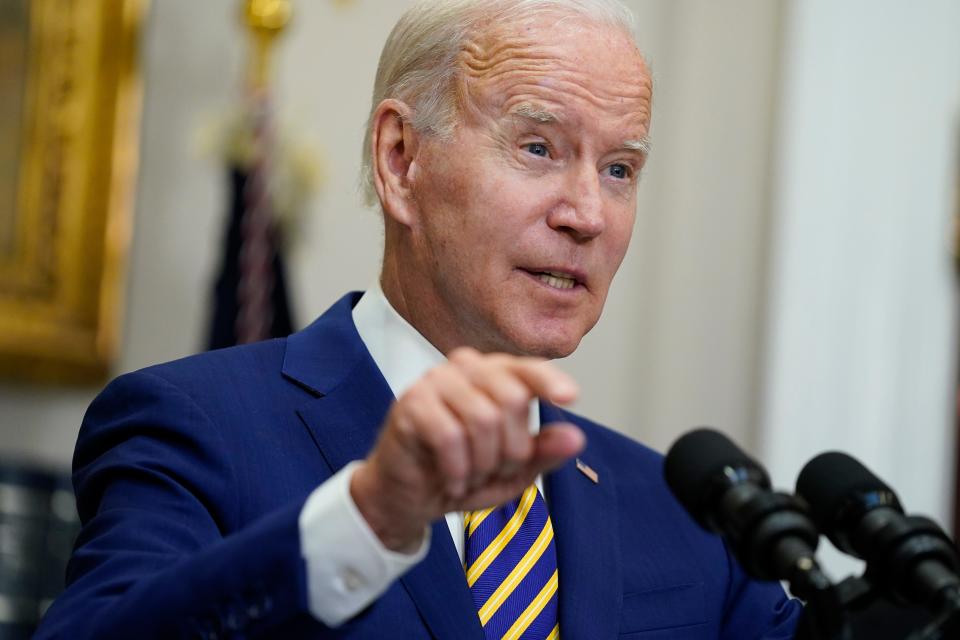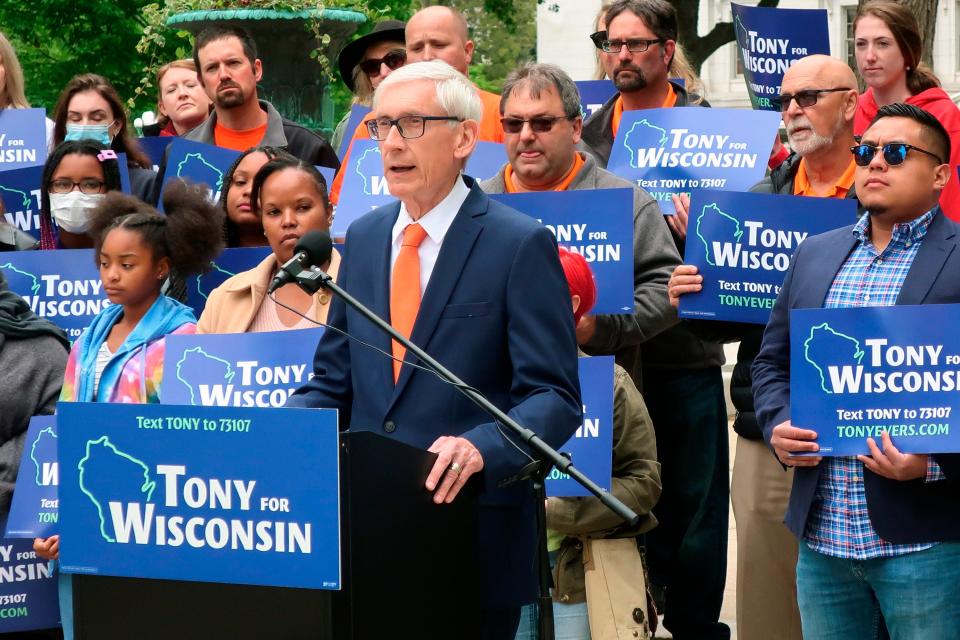Federal student loan forgiveness could be taxed as income in some states
Austin Hammond and his wife may be able to buy a home sooner than expected because of the debt relief President Joe Biden announced in August.
But Hammond, a 25-year-old nonprofit outreach coordinator in Wisconsin, was surprised to learn that, under current state law, he will have to pay income tax on his $10,000 of debt forgiveness even though it’s exempt from federal taxes.
“I think it would be really disappointing to have this opportunity to help working class people, and then have the state legislature cut into that by making them pay a tax on something that is supposed to give them a head start and a foot forward,” he said.
Biden's action will wipe out nearly one third of the $29,000 in federal student loan debt Hammond had after graduating from the University of Wisconsin-Oshkosh in 2021. But he's in one of a handful of states where, at least for now, borrowers getting relief may have to factor in a higher tax bill. Others include Arkansas, California, Indiana, Minnesota, Mississippi and North Carolina
That difference among states adds to the complexity of a new program that an estimated 43 million borrowers are trying to figure out and could fuel political battles in states where changing the taxability will require cooperation from Republicans.
Democrats say they’re easing a crushing burden on the too-high number of people who have to incur large debts to continue their education past high school. Republicans are casting the debt relief as elitist and unfair to the plumbers, waitresses and trucker drivers who never went to college.
"This might be the first tax break I'd oppose," Wisconsin state Rep. Adam Neylon told the Milwaukee Journal Sentinel.

Do I qualify?: What to know about Biden's student debt relief plan.
When will payments start again?: Along with forgiving student loan debt, Biden extends pause.
'Full cancellation'
Democratic Gov. Tony Evers believes “Wisconsinites who have their student loans forgiven by the federal government shouldn't be penalized by having to pay more income taxes,” communications director Britt Cudaback said in an emailed response.
Leaders of the GOP-controlled state legislature didn’t respond to requests for comment.
In Minnesota, another state where the relief will be taxed unless the legislature acts, the head of the Senate tax committee said nothing is going to change without a thorough review of the effects and after getting feedback from Minnesotans.
“The president’s executive order has been very controversial in that, while it might sound good on the surface, as people dig into it they are thinking, `Well, I didn’t go to college because I couldn’t afford it,’” said state Sen. Carla Nelson, a Republican. “I expect a full, robust public debate on this issue in the Minnesota state Senate tax committee.”
For the National Association for the Advancement of Colored People, whose national headquarters are in Baltimore, Md., the issue is starting to bubble up as more is learned about the debt relief process. In states where it’s a problem, the NAACP may fight for a change, said Wisdom Cole, national director of youth and college for the group, which is among those that pushed hardest for the debt relief.
“We want to ensure that everybody sees that full cancellation,” he said.
Paying the bill: White House pegs student loan plan's cost at $240 billion. Experts say it will be twice that.
Student loan forgiveness reality check: Paperwork hurdles, legal challenges could complicate relief

Paying income tax on a 'confusing program'
Tax preparers said it’s another reason people expecting to benefit from the program should pay close attention to the details.
“It’s a confusing program to start with,” said Mark Steber, chief tax information officer at Jackson Hewitt. The complexities include qualifications based on income and loan type, as well as the opportunity to get back previous loan payments. Also, some borrowers may mistakenly think they have to report the loan forgiveness on their federal tax filing or not know some states require it.
“If you're in any one of those situations where it's not perfectly clear, get some help,” he said. “You could end up stubbing your toe very easily.”
Jared Walczak, who is tracking the issue for the Tax Foundation, a think tank in Washington, D.C., said most people “are not going to associate student loan debt forgiveness as taxable income” and some could get a bigger tax bill than expected.
“Someone who is having $10,000 worth of debt discharged is certainly receiving a substantial benefit,” he said. “But this does not mean they're $10,000 richer on that day. They don't have $10,000 more in their bank account. So tax liability on this can come as a surprise and could be an issue for some people.”
COVID and student loans
Biden’s student loan debt relief isn’t taxable at the federal level because of a provision tucked into the American Rescue Plan Act, the $1.9 trillion COVID relief package passed in 2021 without GOP support. Democrats didn’t have the votes to wipe out student debt, but they could exempt from taxes any loans forgiven through 2025.
The provision received little discussion at the time. Instead, the focus remained on whether Biden would decide he had the power to forgive debt without congressional action.
What is a Pell Grant?: Who qualifies? What to know after Biden announces student loan plan
Prepare now: Federal student debt repayments are resuming

The executive action he took to erase up to $20,000 in student loan debt may still be challenged in court.
In the meantime, some states have to decide whether they will count the forgiveness as taxable income.
That’s not a question for the states that automatically match their tax rules with the Internal Revenue Code to make things simpler for taxpayers and administrators.
State v. federal tax codes
But some states – such as Pennsylvania, Mississippi and Arkansas – have very different codes.
The Pennsylvania Department of Revenue, however, recently announced it will not tax the debt forgiveness, though Walczak called their rationale unclear.
Mississippi's code considers it taxable income, according to Lexus Burns, a spokesperson for the state revenue department.
Arkansas is expected to announce a determination within days, after reviewing state income tax law and “this unique situation in which an executive order would cancel a significant amount of student loan debt,” said Scott Hardin, spokesman for the Arkansas Department of Finance and Administration.
Other states – Wisconsin, Minnesota and North Carolina – largely conform to the federal code but have not changed their code to include this provision.
In Minnesota, an update to state code that included the change was initially approved by the politically divided state legislature this year as part of a larger tax bill that did not receive final approval.
Nelson, the state senator who heads her chamber’s tax committee, said the provision wasn’t controversial at the time because Biden hadn’t yet acted. Now that state lawmakers have seen how expansive the forgiveness is, getting a revenue impact estimate is just one piece of information she said is needed before taking another vote.
“There’s a lot of unanswered questions at this point,” she said.
Help for elites at expense of plumbers?: GOP seeks midterm gains by slamming Biden student debt plan

In Wisconsin, the governor has directed the Department of Revenue to include the change in its upcoming biennial budget request to the legislature. Evers is in a competitive race for re-election. His GOP opponent, Tim Michels, did not respond to requests for comment on his position.
Assembly Minority Leader Greta Neubauer said making the change is a priority for Democrats but she hasn’t “seen movement from Republican legislators or interest in that as of yet.”
Student debt relief at the state level
“I do think that there will be sort of growing understanding, as this is rolled out, about the impact that it will have if we refuse to take action at the state level,” she said. “And I expect that those people will be very motivated to engage in this election, given how directly this policy impacts them.”
Because the state legislatures in Wisconsin and Minnesota have adjourned for the year, they would need to hold special sessions or move very quickly when reconvening next year to not bump up against the start of tax filing season.
If the situation is still fluid next year, taxpayers in those states may want to wait to file, rather than have to file an amended return later if the state tax code is changed, said Kathy Pickering, H&R Block’s chief tax officer.
“This is going to be very confusing for many taxpayers,” she said. “What they're hearing are the headlines of, `Hey, my debts been forgiven. Great, this is going to provide such great relief.’ And still the devil is in the details here, because there's so much that still is yet to come in terms of, When will they know for sure? How will that be done? Will they have to file anything in order to apply for that forgiveness? Will it happen automatically?”
Hammond, who was the first in his family to go to college and now serves on the councils of both the city of Menasha, Wisc., and of the Brothertown Indian Nation, sees taxes as a necessity for providing local, state and federal services. But it would be disheartening, he said, if Wisconsin is one of the few states to impose income taxes “on something that’s supposed to give folks in Wisconsin breathing room to get ahead.”
Contributing: Kelly Meyerhofer of the Milwaukee Journal Sentinel.
This article originally appeared on USA TODAY: Student loan forgiveness could be taxed as income in some states

 Yahoo Movies
Yahoo Movies 
